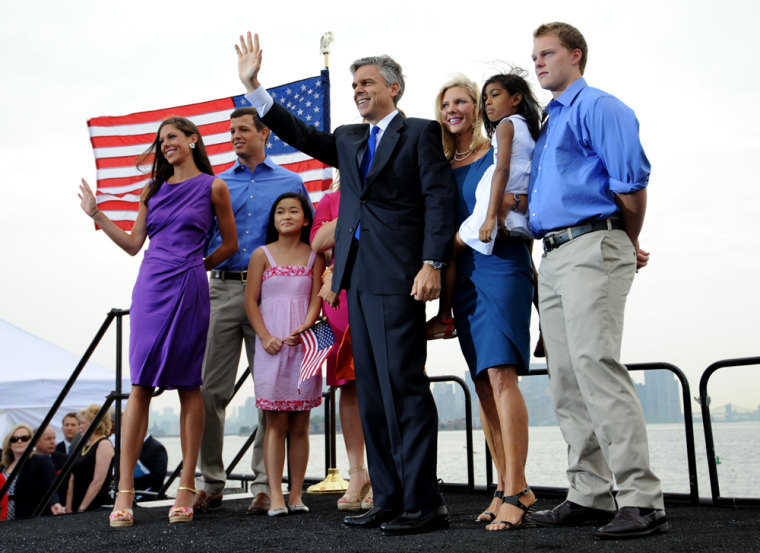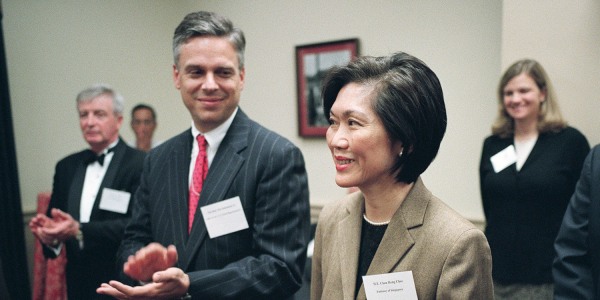Republican Jon Huntsman joined the presidential race Tuesday with the Statue of Liberty over his shoulder, asserting that he and President Barack Obama both love their country but have far different visions of its future. He pledged to halt an "un-American" fading of national power and confidence.
Hoping to set himself apart from other candidates, he also promised to run a civil campaign for the GOP nomination at a time of heated partisan rhetoric.
The former Utah governor focused on Obama, not his Republican rivals, in his announcement address in the patriotic setting where Ronald Reagan launched his fall presidential campaign in 1980. Huntsman said, "The question each of us wants the voters to answer is, 'Who will be the better president, not who's the better American.'"
As for his pledge of civility, he said, "Our political debates today are corrosive and not reflective of the belief that Abe Lincoln espoused back in his day, that we are a great country because we are a good country."
The announcement was all formality for Huntsman, 51. His aides have been planning the bid for months, and the candidate himself has spent the weeks since he returned to the United States from China visiting early primary voting states, courting donors and building a full-fledged campaign.
He joins a GOP field that includes come candidates far better known than he as Republicans search for a strong challenger to Obama, a Democrat seeking his second term. Former Massachusetts Gov. Mitt Romney leads most early national polls and some surveys in states that hold the first contests of the Republican nomination fight.

Huntsman's wife, Mary Kaye, and six of his seven children joined him for the announcement. The family made a dramatic entrance, walking together across a large field before taking the stage.
The multimillionaire businessman stressed his record in Utah, where he won praise from conservative groups for cutting taxes and recruiting new business to the state. He served as governor from 2005 to early 2009, when Obama offered him the China post.
In his speech, Huntsman tried to embrace Reagan's signature optimism about the U.S. even as he warned that the country could slip into decline.
Slideshow 28 photos
Jon Huntsman, Jr.
"For the first time in history, we are passing down to the next generation a country that is less powerful, less compassionate, less competitive and less confident than the one we got," he said. "This, ladies and gentlemen, is totally unacceptable and it is totally un-American."
He vowed to create jobs, streamline the tax code and work to keep the federal budget from being swallowed by Medicare and other entitlement programs and interest payments on the national debt.
"We must make hard decisions that are necessary to avert disaster," he said
Huntsman, who served as ambassador to China under Obama until April, said he respected the president but would steer the county in a different direction.
"He and I have a difference of opinion on how to help a country we both love," Huntsman said.
He took a gentle jab at Obama's signature 2008 campaign themes of hope and change, saying the country is seeking "leadership that knows we need more than hope, leadership that knows we need answers."
Huntsman praised the U.S. military but indicated he would try to as president to draw down U.S. involvement in conflicts abroad.
"We're at war, ladies and gentlemen, and we must manage the end of these conflicts without repeating past mistakes that made our engagement longer and our sacrifices greater than they should have been." he said.
Huntsman is the second Mormon in the field after Romney. Polls show many voters have reservations about electing a Mormon president, and Huntsman made no reference to his religion in his remarks.
Polls show Huntsman starting in the low single digits in a field including Romney, former Minnesota Gov. Tim Pawlenty, former House Speaker Newt Gingrich of Georgia and Minnesota Rep. Michele Bachmann. Texas Gov. Rick Perry is exploring a possible bid as well.
With his service in the Obama administration and moderate positions on some social issues, Huntsman may be a hard sell among Republican voters who have grown markedly more conservative in recent years. He supported legislation allowing same-sex civil unions in Utah and signed a climate initiative with other Western governors aimed at reducing global warming.
But Huntsman is gambling that GOP voters eager to replace Obama will warm to a centrist candidate who could appeal to independents and some Democrats in the general election in November 2012.
Huntsman headed to New Hampshire, the first-in-the-nation primary state, later Tuesday before returning to New York for a fundraising event. He was scheduled to head to South Carolina, another key early voting state, on Wednesday.
Obama campaign spokesman Ben LaBolt took a jab at Huntsman, saying he had spoken in favor of a budget plan crafted by House Republicans that would make deep cuts in Medicare and other programs while cutting taxes on the wealthy.
"Like the other Republican candidates, instead of proposing a plan that will allow middle class families to reclaim their economic security, Governor Huntsman is proposing a return to the failed economic policies that led us into the recession," LaBolt said.
